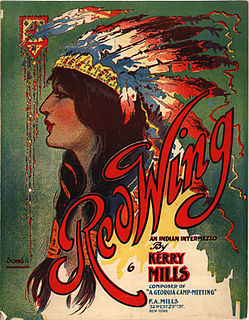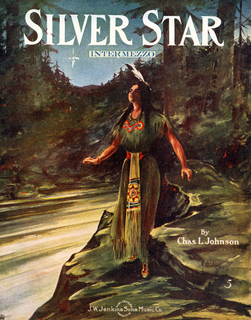Kerry Mills(néFrederick Allen Mills; 1 February 1869 in Philadelphia – 5 December 1948 in Hawthorne, California), publishing also as F.A. Mills was an American ragtime composer and music publishing executive of popular music during the Tin Pan Alley era. His stylistically diverse music ranged from ragtime through cakewalk to marches. He was most prolific between 1895 and 1918.

George Bruce Cortelyou was an American Cabinet secretary of the early twentieth century. He held various positions in the presidential administrations of Grover Cleveland, William McKinley, and Theodore Roosevelt.

Arthur Francis Collins was an American baritone who was one of the most prolific and beloved of pioneer recording artists, regarded in his day as "King of the Ragtime Singers".

"Aura Lea" is an American Civil War song about a maiden. It was written by W. W. Fosdick (lyrics) and George R. Poulton (music). The melody was used in Elvis Presley's 1956 hit song "Love Me Tender".

Gardiner Greene Hubbard was an American lawyer, financier, and community leader.
L'écume des jours is an opera in three acts by the Russian composer Edison Denisov. The French text is by the composer based on the novel of the same title by Boris Vian. It was composed in 1981.

Ellen Beach Yaw was an American coloratura soprano, best known for her concert singing career and extraordinary vocal range, and for originating the title role in Arthur Sullivan's The Rose of Persia (1899).

Dan W. Quinn was one of the first American singers to become popular in the new medium of recorded music. Quinn was a very successful recording artist whose career spanned from 1892 to 1918. Quinn recorded many of his hits in the legendary Tin Pan Alley of New York City.

"1234" is a song from Feist's third studio album, The Reminder. The song was co-written by Feist and Sally Seltmann, an Australian singer-songwriter who also recorded under the stage name New Buffalo. It remains Feist's biggest hit single in the US to date, and her only song to chart on the Billboard Hot 100 and UK Top 40.

"Red Wing" is a popular song written in 1907 with music by F.A Mills and lyrics by Thurland Chattaway. Mills adapted the music of the verse from Robert Schumann's piano composition "The Happy Farmer, Returning From Work" from his 1848 Album for the Young, Opus 68. The song tells of a young Indian girl's loss of her sweetheart who has died in battle.

"Hiawatha " is a song written by Neil Moret in 1901. James J. O'Dea (1870–1914) added lyrics in 1903 and the music was re-subtitled "(His Song to Minnehaha)".

"Silver Star" is an intermezzo composed by Charles L. Johnson in 1910. In 1911, William R. Clay added lyrics which tell of an Indian warrior eloping with an unnamed Indian maiden whom he refers to as his "silver star".

"Golden Arrow " is popular song published both as an intermezzo two-step and a ballad in 1909. The music was composed by Egbert Van Alstyne, with lyrics added by Harry Williams. The ballad is a love story between the unnamed son of a Chief Arrow-Bow and a maiden named Golden Arrow, both of the Sioux nation in Idaho.
Frances Elliott Clark (1860-1958) was an early music-appreciation advocate. As a teacher in twentieth century Ottumwa, Iowa, Clark spent ten minutes in each of her chorus rehearsals telling students about composers or helping them recognize the stylistic features of a work that made it possible to place it in its correct historical context. Shortly thereafter, the phonograph added new opportunities for students to listen to music. Clark, who by 1903 had moved to Milwaukee, told of her introduction to Edison's invention and of its potential. She realized the difference it could make to her students if they could hear professional recordings. Her principal agreed, and approved the purchase of a machine for the schools.

"(You're My Heart's Desire, I Love You) Nellie Dean" is a sentimental ballad in common time by Henry W. Armstrong, published in 1905 by M. Witmark & Sons of New York City. The original sheet music is scored in B-flat major for voice and piano and marked andante moderato.
Grete von Zieritz was an Austrian-German composer and pianist.

The Woggle-Bug is a 1905 musical based on the 1904 novel The Marvelous Land of Oz by L. Frank Baum, with book and lyrics by the author and music by Frederic Chapin that opened June 18, 1905 at the Garrick Theater in Chicago under the direction of Frank Smithson, a Shubert Organization employee. The musical was a major critical and commercial failure, running less than a month. Chapin, however, had proven quite saleable to the publisher, M. Witmark and Sons, and many of the songs were published. The music director was Frank Pallma. The surviving sheet music was published by Hungry Tiger Press in 2002.

Samuel Siegel was an American mandolin virtuoso and composer who played mandolin on 29 records for Victor Records, including 9 pieces of his own composition and two that he arranged. Siegel was the first mandolinist to record on Emile Berliner's phonograph disk-records. He was labeled "America's Greatest Mandoline Virtuoso" and "The King of the Mandolin" in the May 1900 Banjo World.

"Don't Call Me Up" is a song by English singer and songwriter Mabel, included on the 2019 reissue of her debut mixtape, Ivy to Roses, and debut album, High Expectations. It was released by Polydor Records on 18 January 2019. As of February 2020, the music video has received over 210 million views on YouTube, making it her most viewed video on the platform.

"Mad Love" is a song by English singer Mabel from her debut studio album, High Expectations (2019). She wrote the song with Camille Purcell and its producer Steve Mac, wanting to express mutual attraction in a simple way. It is an electropop track with bouncy synths, a quiet-loud dynamic and repetitive chorus hook.

















